On November 11th, 2024, 198 member states of the United Nations Framework Convention on Climate Change (UNFCCC) are to meet for the Conference of the Parties (COP29) in Azerbaijan, a corrupt and authoritarian petro-state. While the host nation of COP29 should ideally unite states in combating the climate crisis, Azerbaijan’s economy is dependent on fossil fuels, and the country suffers from severe environmental degradation and a human rights crisis.
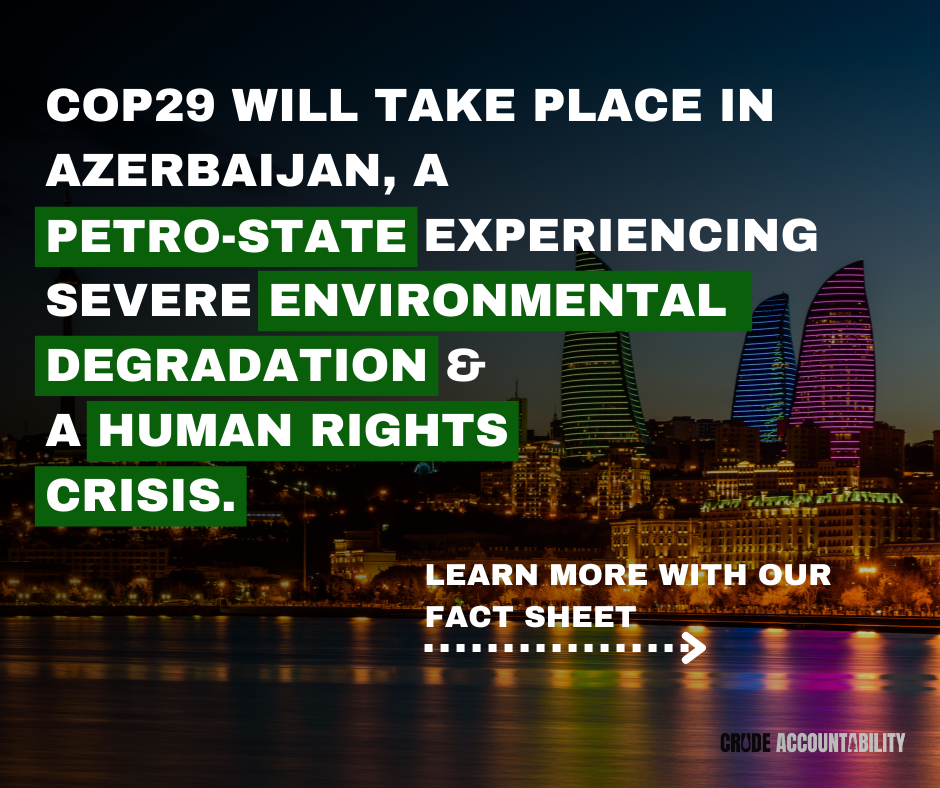
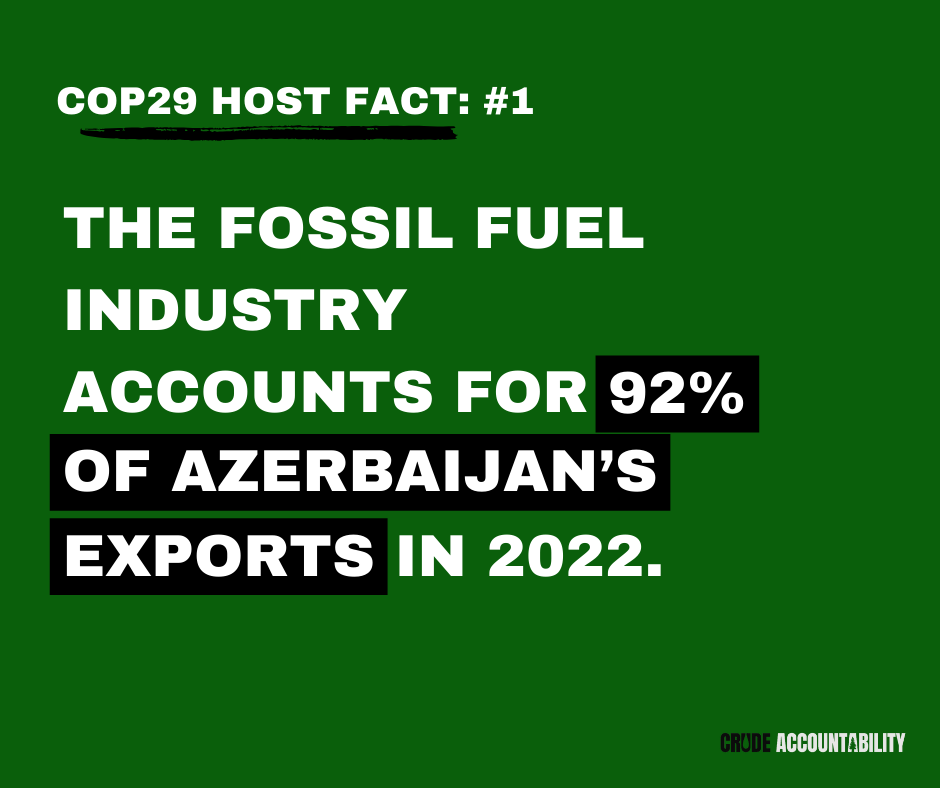
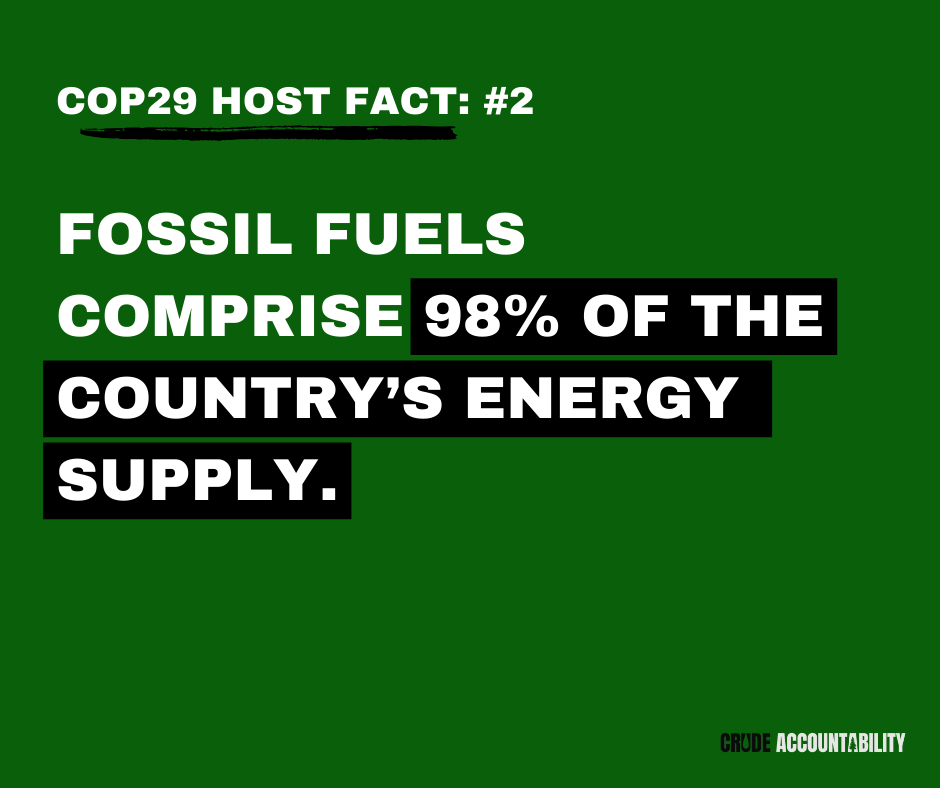
Fossil Fuels
The fossil fuel industry has a suffocating grip on Azerbaijan’s economy, accounting for 92% of the country’s exports in 2022 and 98% of the country’s energy supply. Azerbaijan has extensive potential in the renewable energy sector but has yet to decouple from its fossil fuel addiction, which worsens the climate crisis and degrades the local environment.
Satellite monitoring and ground truthing by OMANOS analytics and Crude Accountability carefully documented this around the Sangachal terminal, which serves as the hub from which oil travels west via the Baku-Tbilisi-Ceyhan pipeline. Satellite imagery detected intensified flaring at the Sangachal terminal between 2018-2019. Residents from the villages surrounding the terminal reported extensive flaring, the smell of sulfur, and explosions from the terminal, which caused difficulty breathing, skin rashes, joint pain, dizziness, memory loss, dental problems, fever, nausea, premature births, and psychological stress. The villagers also reported difficulty with successful crop cultivation, premature livestock deaths, and decreased fish count in the nearby Caspian Sea.
BP conducted air quality and soil sampling in the area, however, this information was inaccessible to the local community. BP’s conclusions about the environmental impact of the site contrast sharply with the reality of the residents on the ground, claiming that the operation of the terminal was affecting neither air quality nor soil in local communities. However, one of the project’s public financiers, the European Bank for Reconstruction and Development, identified seven instances of non-compliance and seven instances of partial compliance with the EBRD 2008 environmental and social standards for project implementation. While BP and the EBRD addressed many of those non-compliances, some remain unaddressed.
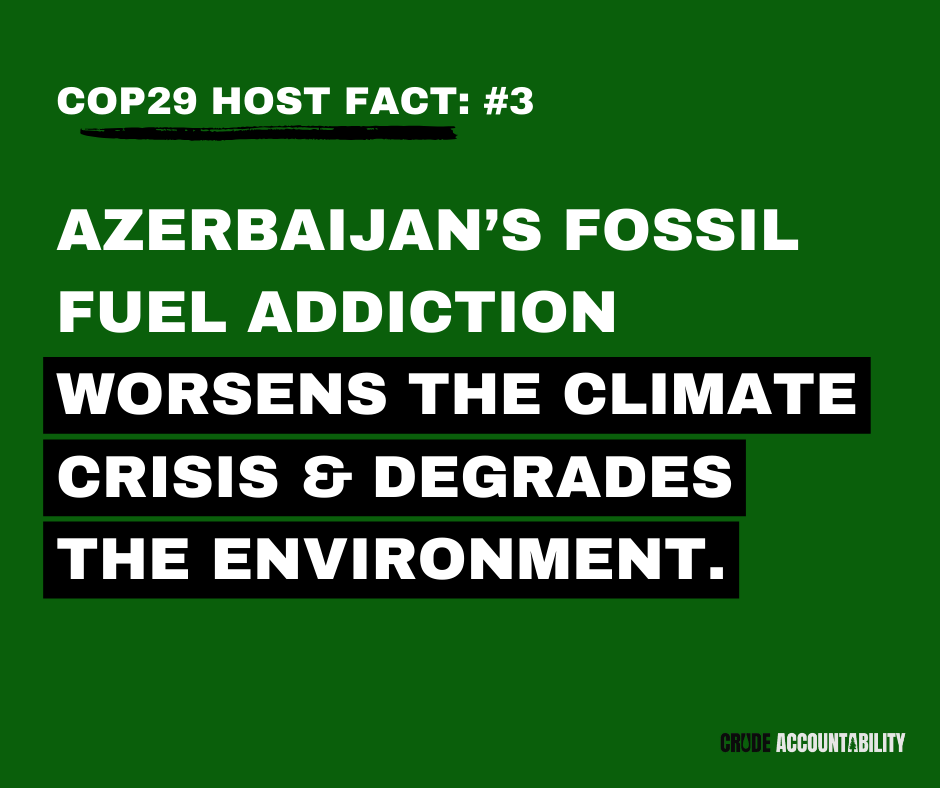
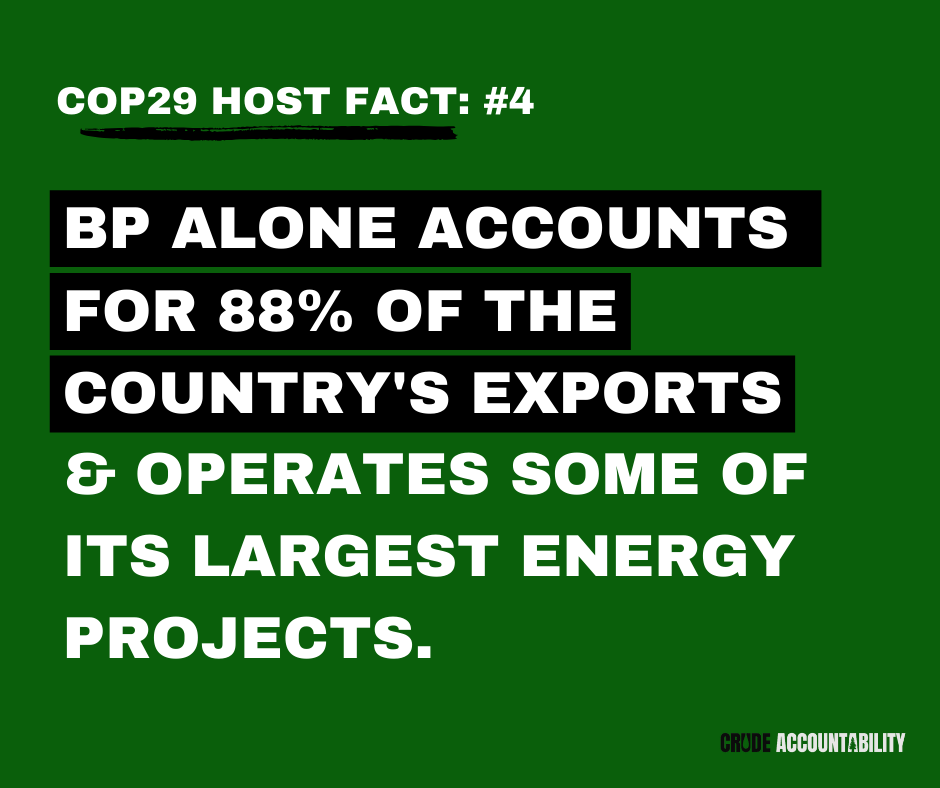
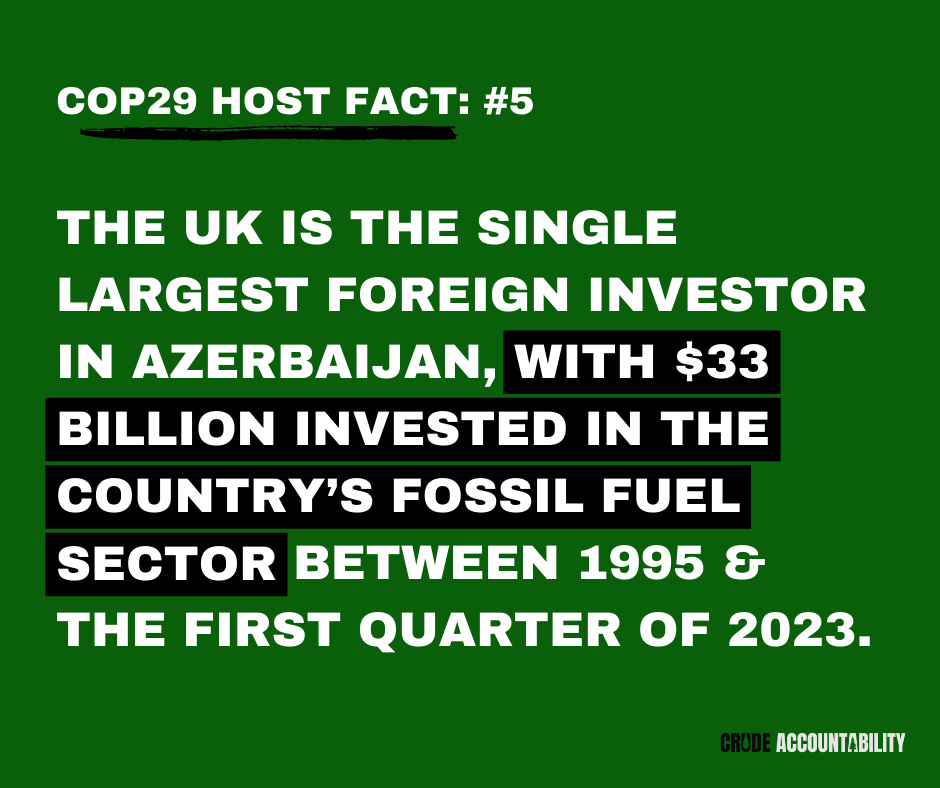
Western Influence
Western energy companies, including BP, hold significant sway over the Azerbaijani fossil fuel sector. BP alone accounts for 88% of the country’s exports and operates some of its largest energy projects. The UK is the single largest foreign investor in Azerbaijan, with $35 billion invested in the country between 1995 and the first quarter of 2023, 94% ($33 billion) of which was in fossil fuels.
The European Bank for Reconstruction and Development has invested over $3.5 billion into the country, with more on the way for Azerbaijan’s participation in the Middle Corridor, through which Azerbaijan plans to expand its fossil fuel exports exponentially. For its part, BP continues its involvement, expanding development of Azerbaijan’s fossil fuel resources.
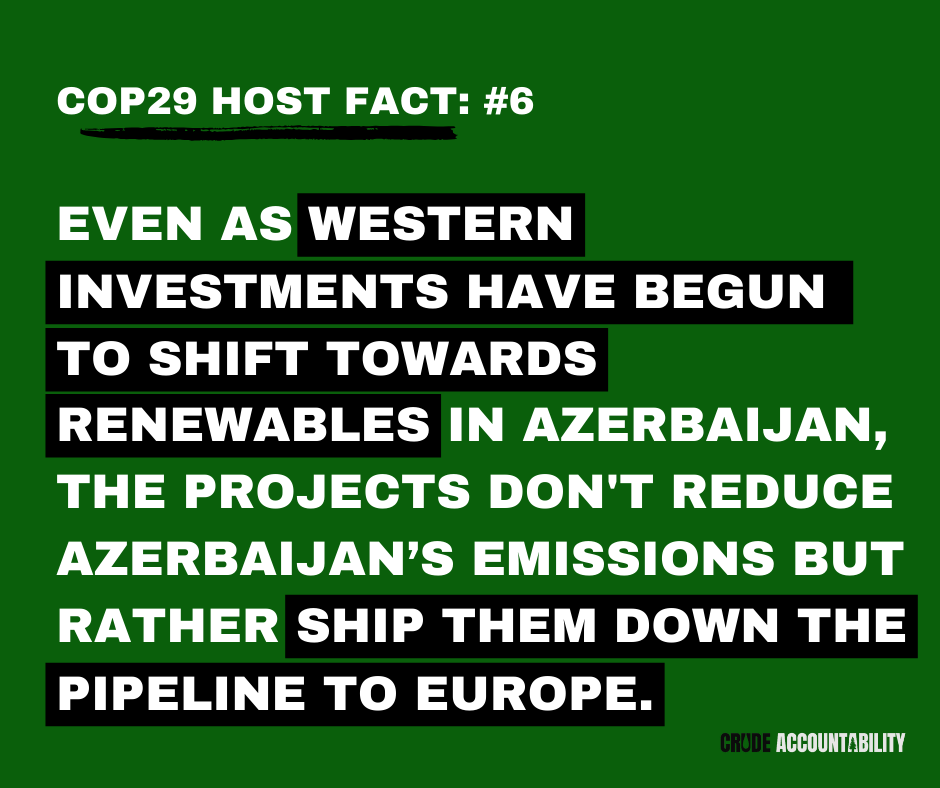
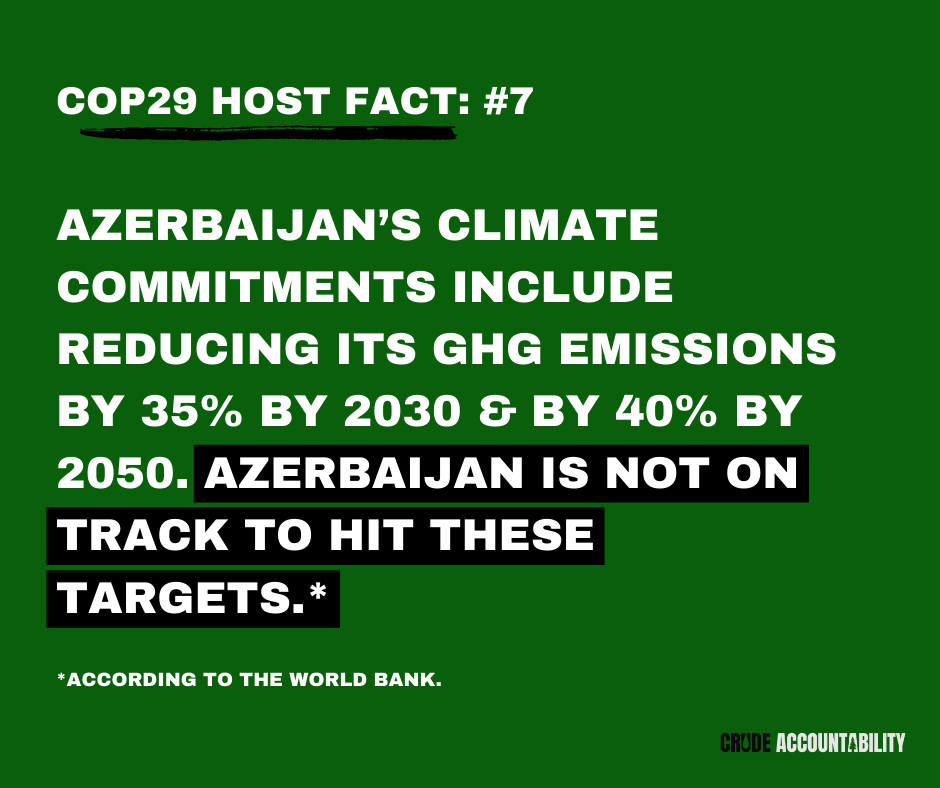

Climate Commitments
Azerbaijan’s climate commitments include signing on to the Paris Agreement and a revised Nationally Determined Contribution, which calls for a reduction in GHG emissions by 35% by 2030 and by 40% by 2050. According to the World Bank, Azerbaijan is not on track to hit these targets.
Even as Western investments have begun to shift towards renewables in Azerbaijan, the projects don’t reduce the emissions from Azerbaijan but rather ship them down the pipeline to Europe.
As of March 4th, 2024, Azerbaijan has signed the Global Methane Pledge.
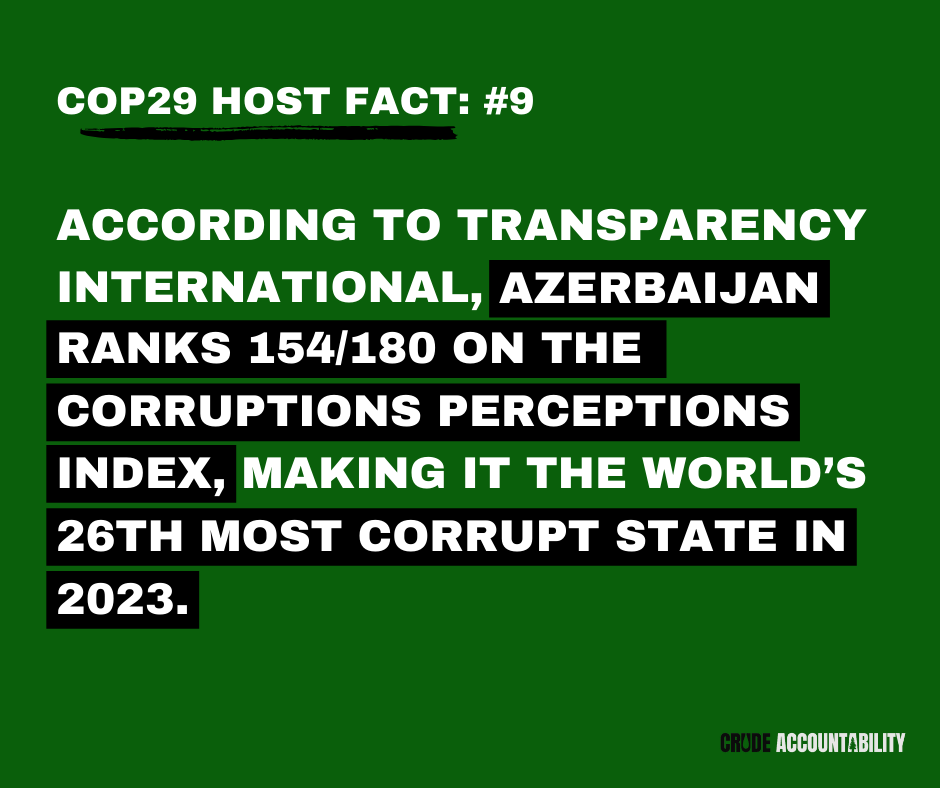
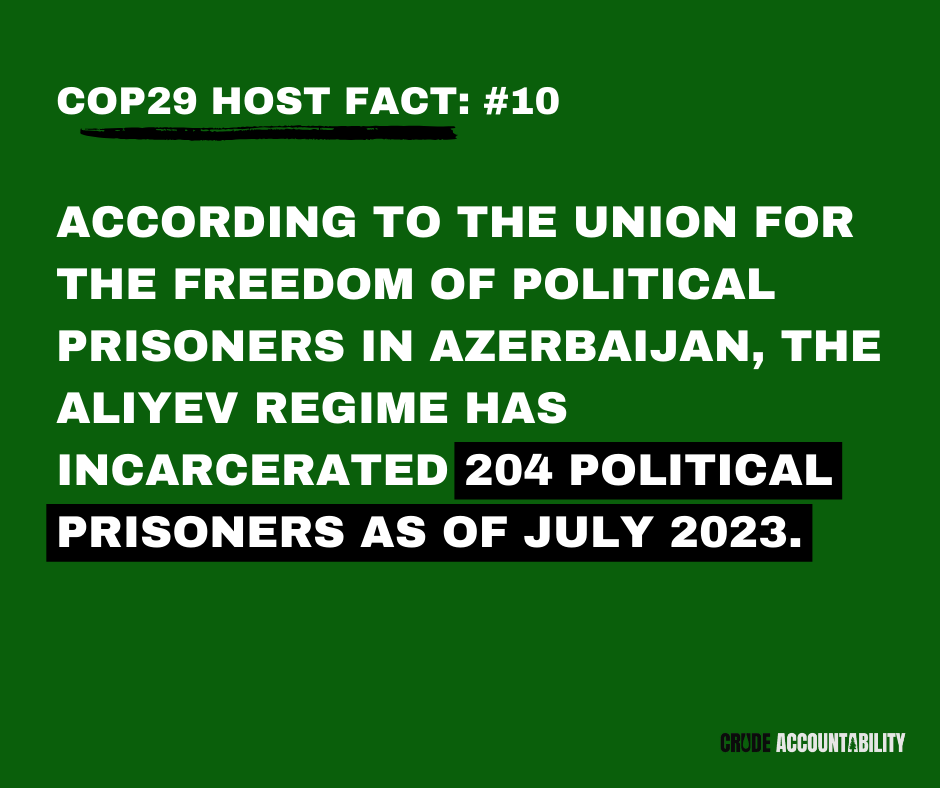
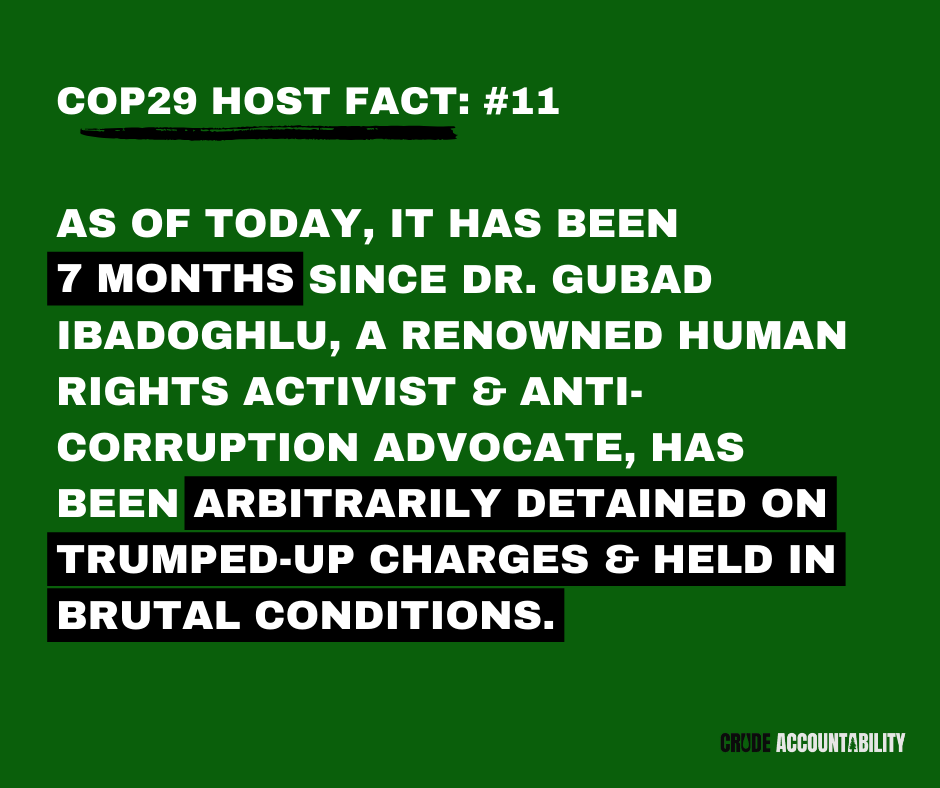
Corruption and Human Rights
The fossil fuel sector has inflamed a growing human rights crisis in the country. Beyond its impacts on the daily lives of Azerbaijanis living in proximity to the country’s oil and natural gas facilities, the industry is ripe with corruption, and those who speak out about it are persecuted by the government.
According to Transparency International, Azerbaijan ranks 154/180 on the Corruptions Perceptions Index, making it the 26th most corrupt state on the planet in 2023.
In 2020, Crude Accountability partnered with Dr. Gubad Ibadoghlu, a renowned academic and human rights defender, to investigate allegations of corruption within the State Oil Fund of Azerbaijan (SOFAZ).
Dr. Ibadoghlu’s investigations showed that although SOFAZ is tasked with financing strategic projects to advance the socio-economic development of Azerbaijan and collect and save oil revenues for future generations to ensure cross-generational equality, between 2003 and 2018, the vast majority of the profits from the Azeri–Chirag–Gunashli oil field, operated by BP, were collected by SOFAZ, providing $93 billion to the state budget or 55.9% of the entire state budget. These transfers accounted for 86.9% of SOFAZ’s budget expenditures.
The rest of SOFAZ’s expenditures should go into its asset portfolio and oil and gas savings, the latter being mandated at 25% of peak oil and gas revenues. Despite “peak revenues” being reached between 2011-2015, SOFAZ only observed the 25% rule once. Even in 2020, SOFAZ planned to only save 6.6% of revenues while spending 93.34%. In other words, rather than using the funds for future generations as mandated, SOFAZ used the funds for contemporary projects and purchases.
As an example, SOFAZ purchased a luxury building on St James Street in the West End of London for £177.35 million. Of the £34.74 million earned from the rent of this building, only £2.02 million (5.83% of the sum) was transferred to Azerbaijan’s state budget.
The Azerbaijani government’s lack of transparency has international consequences. Azerbaijan was suspended, and subsequently withdrew, from EITI in 2017. Azerbaijan was permanently suspended from the Open Government Partnership in 2023.
Civil society within Azerbaijan has, for years, attempted to make the corruption crisis clear to the Azerbaijani people. The Aliyev regime has responded with brutal force.
In 2023, Dr. Gubad Ibadoghlu, a renowned human rights activist and anti-corruption advocate, and Abzas Media, one of the few remaining independent media sources in Azerbaijan, were targeted by the Azerbaijani state. With trumped-up charges, the Azerbaijani authorities have continued to arbitrarily detain and deny the basic rights of these few oppositional voices left in the country, regardless of the outrage expressed by the international media, civil society activists, the European Parliament, representatives of the US Congress, and academics. Unfortunately, the plights of Dr. Ibadoghlu and Abzas Media are symptoms of a crackdown on civil society in Azerbaijan.
In 2013-2014, changes were made to Azerbaijan’s legislation pertaining to NGOs regarding registration and foreign funding.
Almost immediately this new legislation was used as a hammer against the Economic Research Center (ERC), led by Dr. Ibadoghlu, whose business account was frozen and from which $5000 was taken by the Azerbaijani state. The Aliyev regime continued to target ERC and Dr. Ibadoghlu, along with other NGOs, in the subsequent years. The state filed criminal charges, raided offices, confiscated property, forced people out of their jobs, and discriminated against family members of those they perceived to be in opposition to the regime.
According to the Union for the Freedom of Political Prisoners in Azerbaijan, the Aliyev regime has incarcerated 204 political prisoners as of July 2023. In December 2023, the UFPPA updated that list to 254 political prisoners.
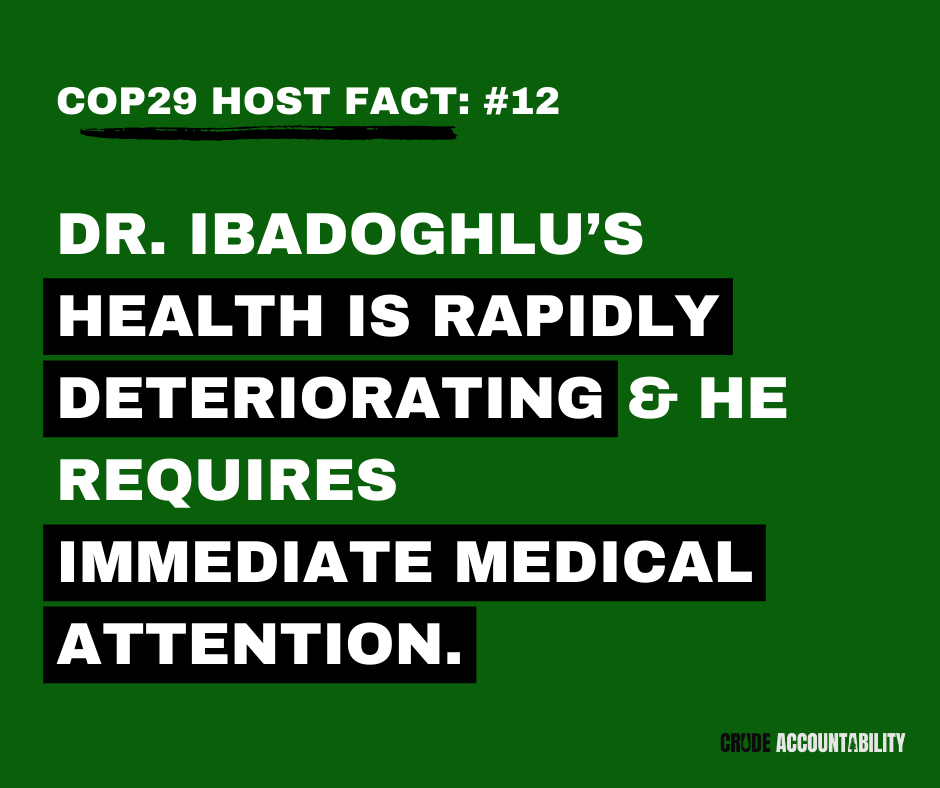
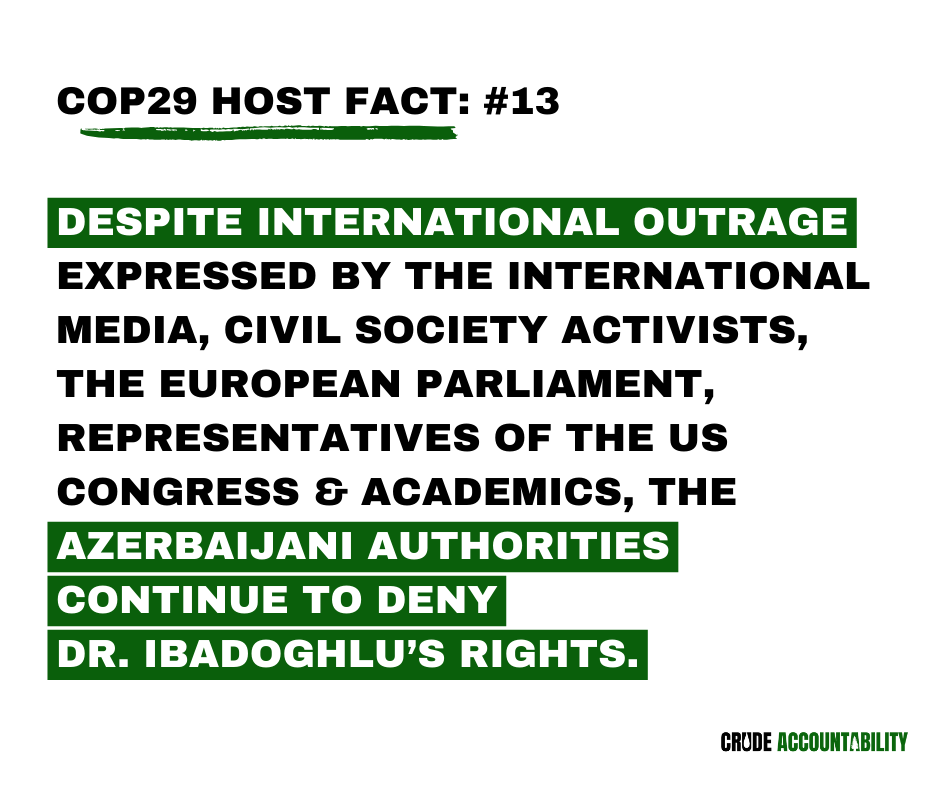
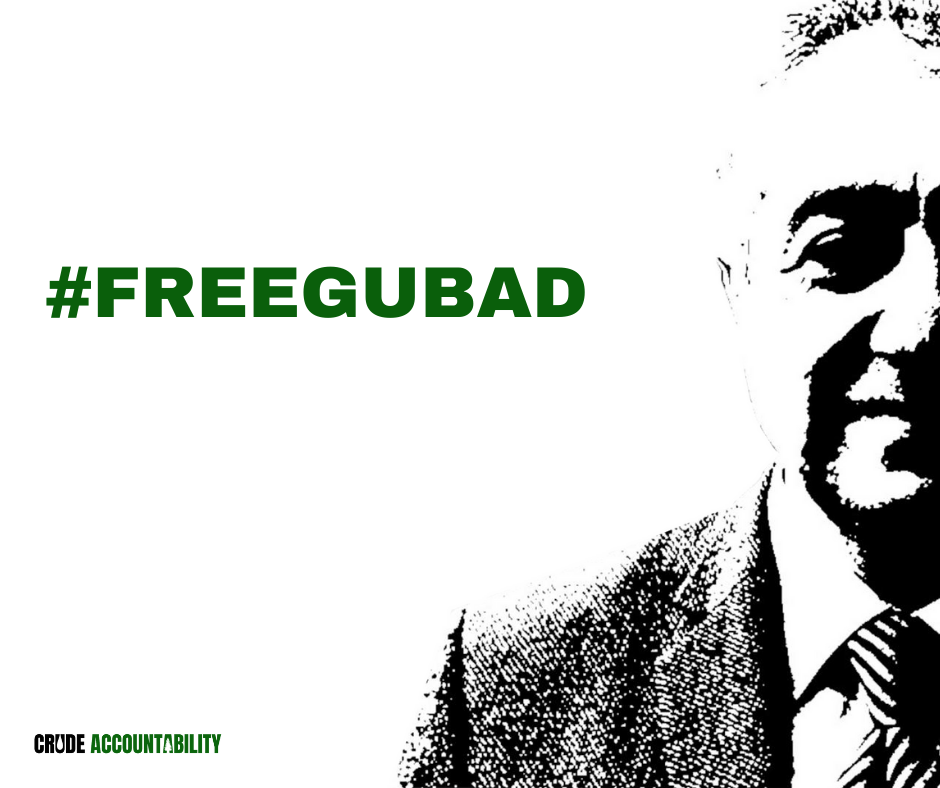
The crisis in Azerbaijan goes beyond civil society; average citizens are also affected. Critical issues related to food access, medical care, housing, clean air, and education are among the costs of Azerbaijan’s reliance on fossil fuels and its human rights crisis. Protests over local environmental concerns are brutally repressed, causing concerns about how the government of Azerbaijan can fairly and responsibly host COP29 when those who speak out about environmental and climate concerns are silenced by the regime.
The case of Azerbaijan makes it clear that the climate crisis is a human rights crisis, in which the links between corruption, authoritarian regimes, and the fossil fuel industry must be made transparent if we are to create a successful roadmap to a more just and sustainable future. The question is how holding COP29 in Azerbaijan contributes to this goal.
